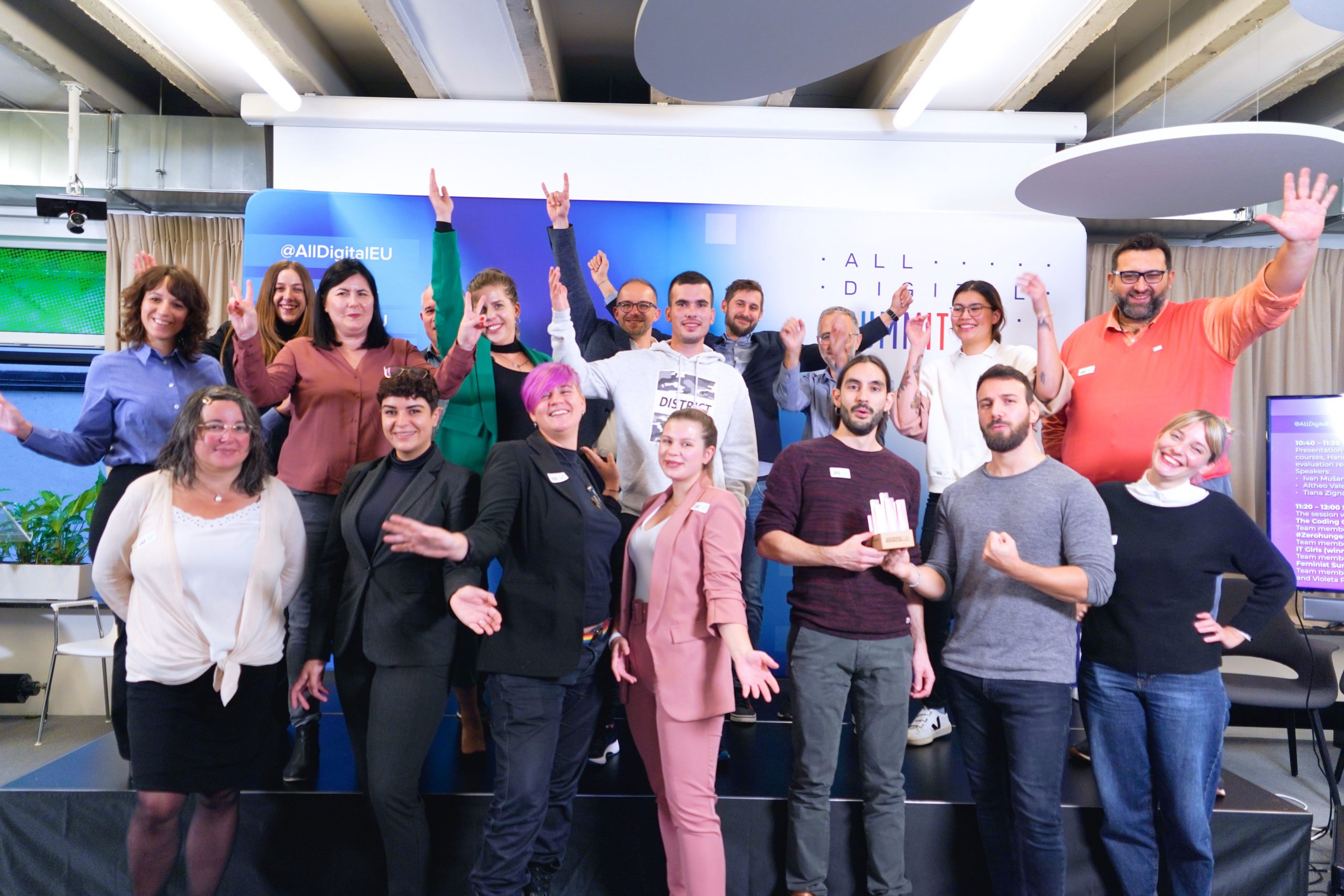Social Hackademy conference highlights #HackAD success stories and celebrates digital and social innovation
The Social Hackademy International conference reaffirmed our conviction that investing in young people’s digital skills and meaningfully including them in the creation of the future is the right approach to the digital transition in Europe. Co-creation, digital skills development and innovation were the core topics discussed on the third day of ALL DIGITAL Summit which hosted Social Hackademy International Conference.
The Social Hackademy project fosters digital skills and competencies of young people from the disadvantaged background by implementing collaborative educational activities based on the Social Hackademy co-creation methodology. The methodology positions young people in the centre of the co-creation process aimed at developing digital solutions for societal challenges.
External speakers offered inspiration and reflection on the key concepts embedded in the project’s methodology. The keynote speeches by EU Youth Coordinator Biliana Sirakova and Michela Magas, Chair of the Industry Commons Foundation and innovation advisor to the European Commission and the G7 leaders opened the event with insightful and inspiring inputs that set the tone of the conference.

We learnt from the newly created European Coordinator of Youth Activities within the European Commission Biliana Sivakova about EU’s plans and support for upskilling young people and including them in the shaping of the future of the EU, announcing the European Year of Youth 2022, and stressed that ‘’When supporting young people in their personal and professional development we have to focus on the development of different sets of skills and competencies as done in the EU Code Week and your Social Hackathon. Both initiatives combine the development of digital skills and soft skills like creative thinking, teamwork, problem-solving, etc.’’
Michela Magas, Chair of the Industry Commons Foundation and innovation advisor to the European Commission and the G7 leaders explained and showcased how innovation impacts and changes our societies. We understood how effective digital skills can be to create and innovate. She mentioned: ‘’The idea of co-creation has now entered high-level policy. All disciplines need to join forces in order for us to stimulate and facilitate societal transformation. One of the ways on how to do that is to transfer best practices developed in the grass-root community through innovation, hands-on sessions and learning to a high policy level. The agenda of the conference featured presentations of the methodology and tools developed in the project that supports its implementation.
Project partners also shared results and findings from methodology piloting that took place in Croatia, France, Greece and Italy.
Very interesting examples of young digital experts who developed their digital innovative projects have been presented during the Social Hackademy Award ceremony and the first winner was announced at the event: Team Alimenta #Zerohunger 2 from Italy was the most convincing in terms of local community impact, social relevance and innovation, transferability and openness and adherence to the SDGs.
The event was rounded up with panel debate on the potential and critical elements of co-creation methodologies for solving various societal challenges and empowering young people with Arjana Blazic (DigiEduHack), Dr Ping Kong (Heritage & Education), Salvatore Nigro (JA Europe) and Thomas Matthew (European Youth Forum).
We had the chance to experience how a #HackAD workshop might work to unite and put together people from remote and achieve significant results, delivering solutions to real world issues.
Altheo Valentini, ALL DIGITAL Chair, highlighted that ‘’In social hacking, the focus is not on the event and the contest but rather on educational progress. That is why we [Social Hackademy consortium] positioned hackathon as a part of training and learning experience.’’
To conclude with the words of Ivan Mušanović, trainer and project manager from CTK Rijeka, who lead the upscaling of the methodology: “The Social Hackademy methodology stands out because it enables young people to create something concrete while learning skills that are beneficial for them. Together this gives them a sense of accomplishment.”
00:00:00 Opening
00:01:40 Welcome from Altheo Valentini, Chair of the Board of ALL DIGITAL 00:07:30 Welcome from Peter Palvolgyi, CEO of ALL DIGITAL KEYNOTES: 00:11:00 Address from Biliana Sirakova, EU Youth Coordinator, European Commission, Directorate-General for Education, Youth, Sport and Culture 00:27:36 Address from Michela Magas, Chair of Industry and member of President Von der Leyen’s New European Bauhaus High Level Round Table, Commons Foundation
01:00:26 Social Hackademy and me
01:02:05 Valentina Canonico, association ATLAS
01:06:30 Ivan Mušanović, trainer, CTC Rijeka
01:12:15 Roxane Cabit, trainee and hacker from France
01:19:23 Dina Arvanitaki, trainee and hacker from Greece
01:28:50 Co-creation: Empowering young people for the 21st century 01:30:20 Ivan Mušanović, Project Officer, CTC Rijeka
01:43:50 Altheo Valentini, CEO, EGINA
02:03:16 Tiana Zignani, Project Officer, Public Libraries 2030
02:06:30 Social Hackademy Awards #Zerohunger 2 (winners of Social Hackathon Umbria) The Coding Gang (winners of Social Hackathon Patras) IT Girls (winners of Social Hackathon Rijeka) Feminist Surge (winners of Social Hackathon Montpeiller)
02:47:50 PANEL DISCUSSION:From developing a solution to actual implementation Arjana Blazic, DigiEduHack Ping Kong, Founder, Heritage & Education Salvatore Nigro, CEO, Junior Achievement Europe Thomas Matthew, Board Member, European Youth Forum
03:46:30 Mini Hack session





No Comments